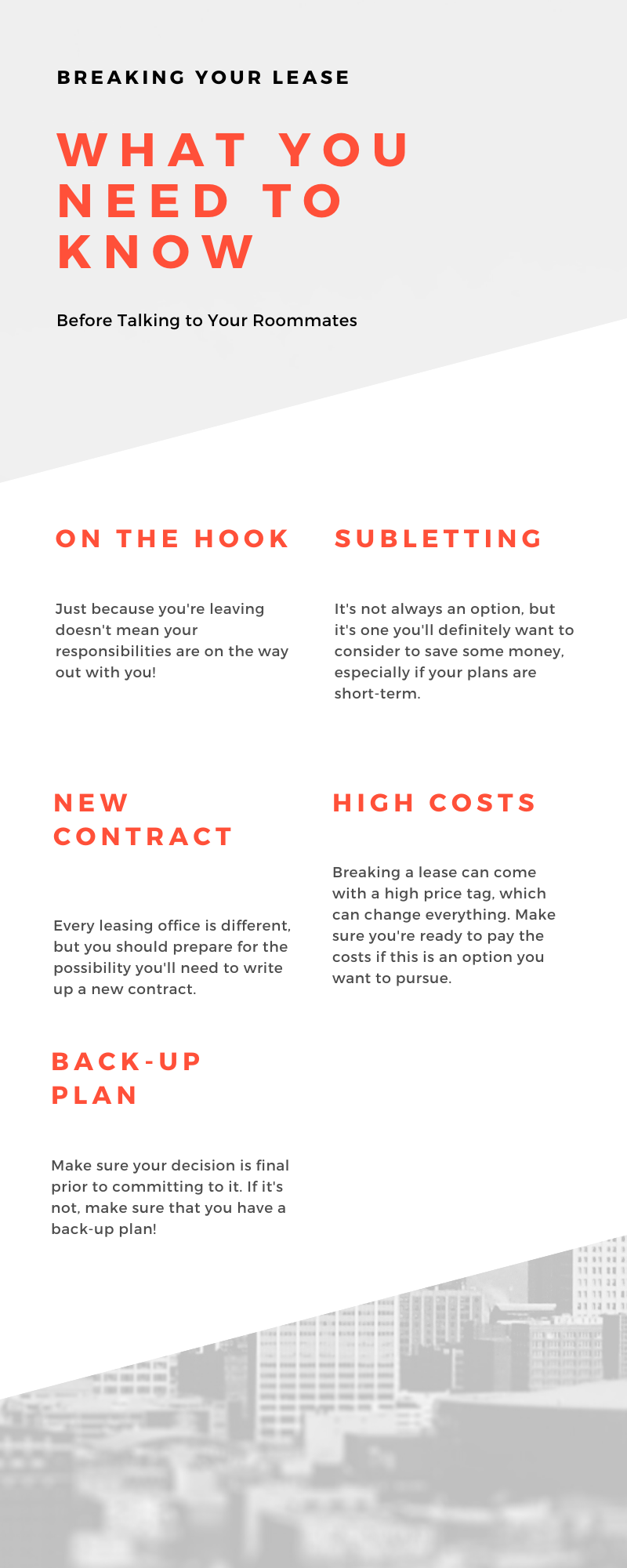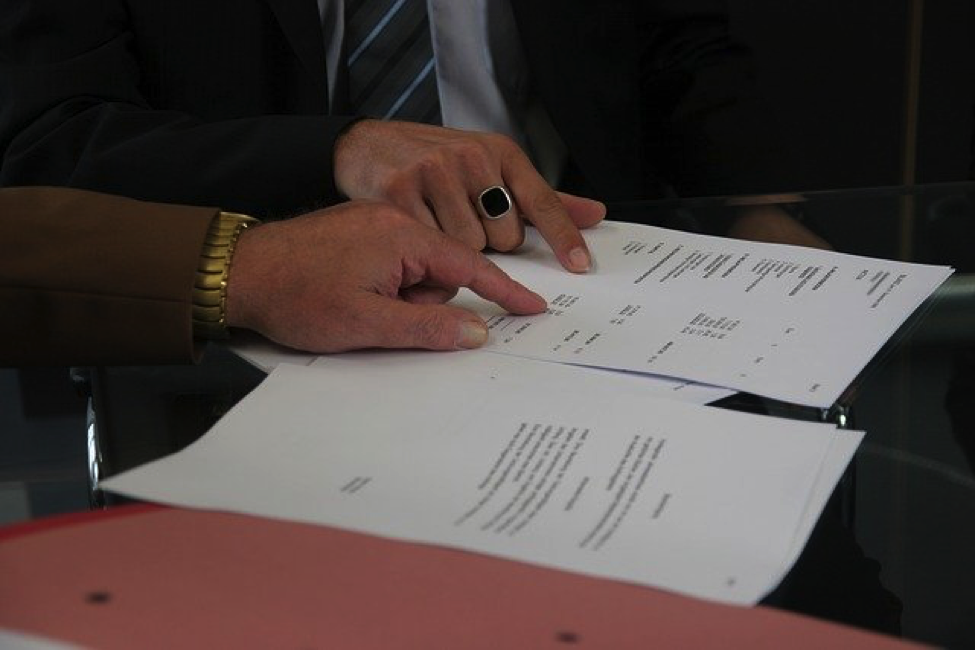What to Know if You Need to Break Your Lease and How to Talk to Your Roommates About It
Things come up in college all the time, whether that be study abroad experiences or internships that take you away from campus. Whatever the situation, there are many reasons for which you could need to break your lease.
That being said, having a difficult conversation with your roommates is no easy feat, and can be entirely overwhelming.
When it comes down to it, if you need to break your lease, there are six things you need to know.

Photo Via Pixabay
1. You Might Still Be On The Hook
First and foremost, just because you are planning on breaking your lease does not mean that you are escaping your contract, scot-free. In fact, leaving your roommates high and dry isn’t always financially feasible for them, so you may still be on the hook for your portion of the rent.
This is all dependent upon the leasing contract you signed, but this document could mean that you have to pay your share of the lease through the end of the lease term.
While there are typically workarounds here, you should always consider the option that you’ll still end up paying your share of the rent, which can certainly add up, especially if you’ll also be paying rent at a different location.
2. Subletters May Not Be An Option
Subletting your apartment is a giant pain in the butt, which is something I share from experience.
For one thing, you’ll need to see if this is an option in your lease. If it is, most often, you’ll have to find the subletters on your own, and then draw up another contract with your leasing office to write them into the lease.
From here, you should understand that, in most leases, you will be responsible for the damages done by your subletters. Ultimately, it’s your name on the lease, and therefore your money on the line, especially if your subletters default on their rent and don’t pay their share.
While this isn’t always the case, and you may have a leasing office that’s more hands-on with the subletting process, you’ll definitely want to look into that before making any commitments.
In addition, subletting may not even be an option at your apartment complex.
Many buildings actually put these clauses into their contracts as issues tend to arise when allowing renters to choose their subletters. For this reason, they simply ensure subletting isn’t an option, which, to point number one, would leave you on the hook for your share of the rent.
3. You May Need a New Contract
As previously mentioned, if you are leaving your lease, two, three, or four shares of the rent now change, increasing the rent of your roommates (assuming you won’t be using subletters).
In these instances, you should consider writing up a new contract with your leasing office to take you off the lease.
If your roommates agree to pay larger portions and change their minds later on, and your name is still on the lease, you are still responsible for your share, which may not be financially feasible for you.
Talk with your leasing office to determine if you would need a new contract or if you can simply buy out of your lease to avoid the fiasco later on. Because trust me, you won’t want to get hit with a bill for three months’ rent that you missed and cannot afford to pay.
4. Costs May Be Associated
The cost of breaking a lease will vary dependent upon the building. For some agencies, you’ll simply need to pay a month’s rent to break your lease. For others, you could pay three months’ rent or more.
In some instances, I’ve heard of individuals having to pay the remainder of their lease as “breaking” the lease wasn’t really an option.
Just know that breaking a lease is a challenge, and it could come with a high price tag attached to it. So consider these costs, check into whether or not that’s financially feasible for you and then move forward from there.
5. You Should Have a Contingency Plan
Now, what happens if you break your lease and your other plans end up falling through? What are you supposed to do then?
Breaking your lease doesn’t always mean that you have something nailed down otherwise, so what should you do in the instance that you’ve broken your lease and realize you’ve made a mistake?
These are all considerations you should take to heart before breaking your lease.
For one thing, you should be serious about these alternative plans. For another, you should be positive that you won’t be returning to the lease later on. If you are simply planning on studying abroad for a semester, you may want to consider subletting for that semester and then returning to your lease the next semester.
Breaking a lease should be used as a last resort if you can no longer stay in that apartment or building. Basically, it’s a final step to getting out of your lease, so you should always be confident in that decision before actually making it.
6. It May Not Be An Option
Last, but certainly not lease, you’ll need to consider the idea that it’s not even a possibility to break your lease.
Some leasing offices won’t let you do it, or will, but require that you pay out the remainder of your lease, which is essentially the same thing as not allowing it.
Such a high price tag may not be worth it, and you may want to simply consider subletting.
However, the only way to truly know and understand your options is to visit your leasing office and ask them some questions regarding your options. They’ll let you know what you can and can’t do, so this is a great starting point.
You should also read through the fine print in your lease to ensure you’re educated prior to this meeting, as you’ll want to be as familiar as you can be with the document that you signed.

So, once you’re well-versed in what you need to know when breaking your lease, you should also note that you’ll likely need to converse with your roommates about the change of plans.
Again, this isn’t an easy task, and one you should be well prepared for in order to ensure everything is done correctly and no feelings are hurt in the process.
So, to assist you in that difficult conversation, here are six things to know when talking to your roommates about breaking your lease.
1. They Could Be Angry/Upset
Conversations get heated all the time, but when you talk about breaking a lease and making plans that alter someone else’s plans, you can expect things to get a little emotional.
While most individuals will handle this news well, there are some that may become angry or upset at your change of plans. Just be prepared and expect that things aren’t going to be smooth sailing simply because you’d prefer they were.
Get ready to have a difficult conversation, and keep your cool throughout, no matter what. You’re throwing them the curveball, so you should allow them to cope with these changes as they need to.
2. There Will be a Money Conversation
Money is always a topic of conversation when living with roommates, and when breaking your lease, you should assume it will be another conversation.
For one thing, your roommates will be concerned that such a choice will increase their monthly payments, which may not be feasible for them. Remember that your decision can impact their wallets, so you should be mindful of that.
Be prepared to have a conversation about money and be ready to answer their questions regarding the next steps. You should look into your options with your leasing office prior to this conversation so you’re well versed in what’s needed from everyone in order to make this transition as smooth as possible.
3. They May Not Agree With Your Plans
Just because this is a decision that you’ve made does not mean that they have to be on board with it. In fact, you can expect that it will take them a little while to get on board with the idea, if at all.
That all being said, you should prepare for the idea that your roommates won’t agree with your plans and will try to talk you out of them. While typically for selfish reasons, when you live in close proximity to someone, you become close with them and blindsiding them with a move like this could hurt.
In addition, they may not be on board with subletting your room or paying an increased share in rent, which is their prerogative. Just be ready to have some difficult conversations about what they are and are not willing to do, and have a couple of options available to help appease the situation.
4. They Aren’t Responsible for Everything
If your conversation doesn’t go nearly as well as you would’ve liked, you may learn that your roommates aren’t willing to put themselves on the line, which, again, is their prerogative.
Understand that they aren’t responsible for your decisions, so you may end up on the hook for more than you bargained for, such as continuing your rent payments, dealing with roommates that won’t agree to a sublease, etc.
Just because you’ve made a decision doesn’t mean that they have made the same one, so you should definitely be prepared to deal with a couple of kinks in your plan along the way. When you have a roommate, they have equal say in the goings-on in the apartment or building and have just as much say over what to do with it.
5. You May Need to Show Them the Ropes
That all being said, your roommates may be super supportive and on board with your plans, but don’t really understand what this means for them.
For instance, some may agree with subletting, but may not know where to begin with that process, or may want you to take the lead and ensure you have someone to move in upon your leaving.
Basically, just because you’ve done the research and looked into the situation doesn’t mean that they are as familiar with the steps, so you’ll need to be patient and willing to help them learn what needs to be done, for everyone’s sake.
The more helpful and informative you are in your conversation with them, the more likely the conversation is to go well. Just be willing to step up and assist, as you are the one that’s making the change, not them.
6. Do What You Need to Do
Last, but not least, you need to do what you need to do. Odds are, you have not made this decision lightly, and you’re only trying to do what’s best for your education, whether that means studying abroad or taking on an internship, or leaving campus.
Whatever your future plans, they are yours, and you’re always able to do what’s best for you, as you should.
So the conversation with your roommates may be difficult, but if you’ve thought this through and decided this is what you want, then you need to stick to your guns and ensure you do exactly what you need to do in order to make your dreams a reality.
Don’t settle because you feel guilty; this is your education, and you need to do what’s best for you.

Photo Via Pixabay
Again, breaking your lease can be difficult, especially if you weren’t planning on it. Not only do you have to grapple with the logistics of breaking that lease, but you also have to consider your roommates and have the difficult conversation with them to ensure everyone is on the same page.
It’s not an easy task, but with the above 12 tips, you’ll be well prepared to handle everything with grace and ensure that all sticking points are worked through.
Good luck!
Interested in using our roommate matching formula to find the perfect college roommate for you? Create a profile & take the roommate quiz on Roomsurf! Get Started
